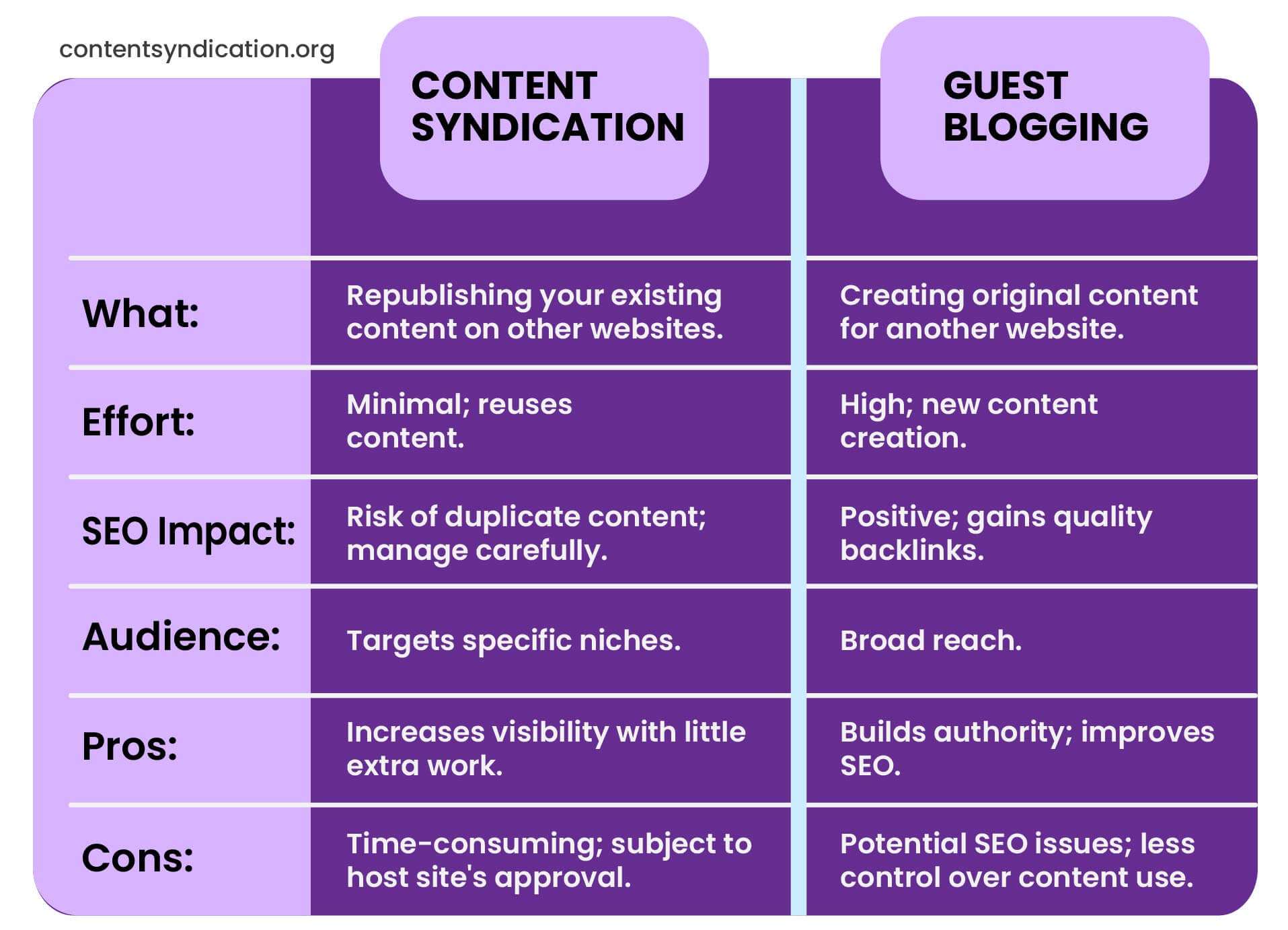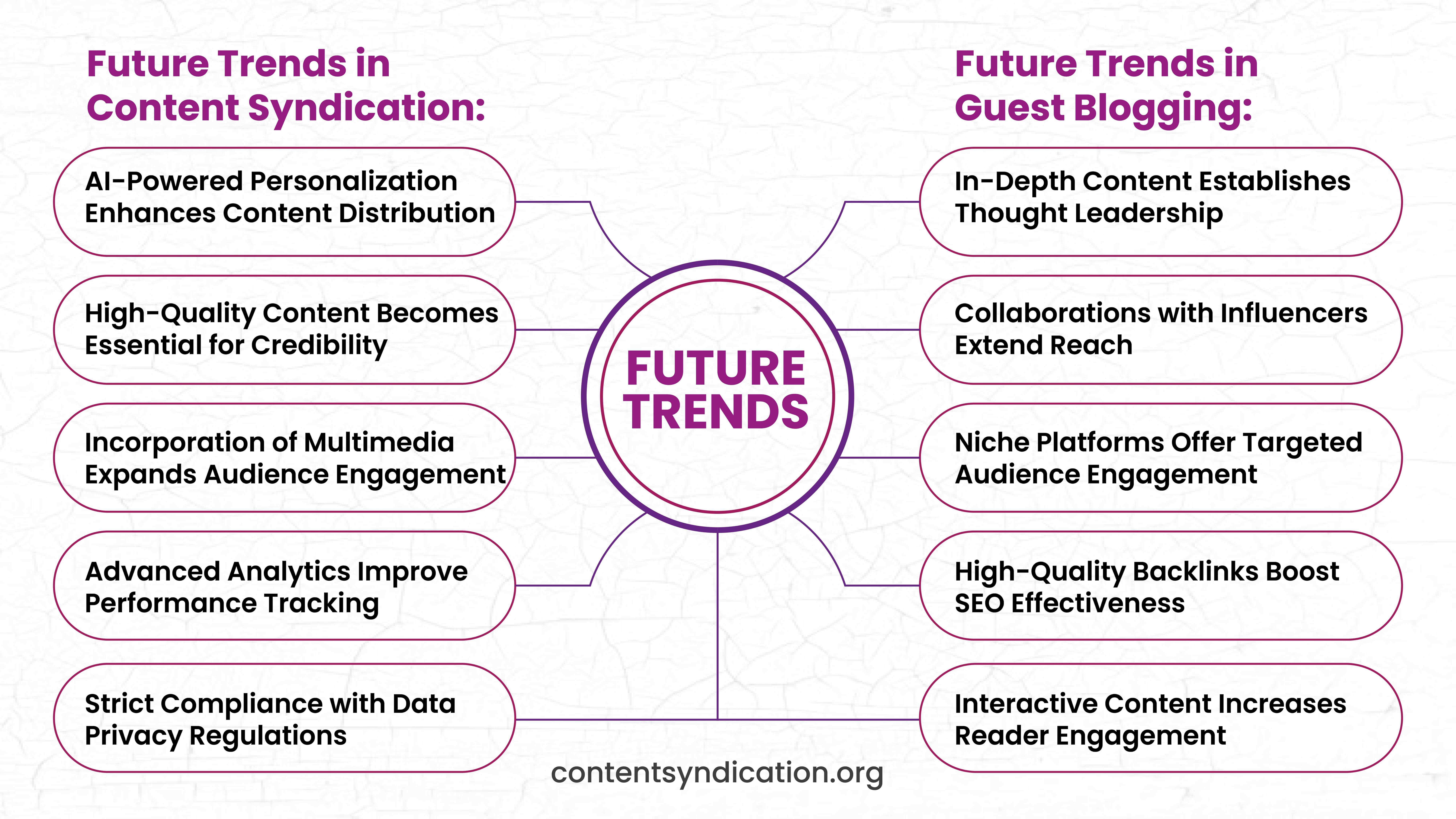Link building is what most bloggers focus on most of the time. This is where guest blogging becomes important. Indeed, this method is one of the most promising SEO tactics.
Yes, there are several ways to acquire backlinks, but obtaining them from reputable websites is the most powerful one.
However, guest blogging is often confused with content syndication.
Both content syndication and guest blogging aim to expand the reach and visibility of your brand.
According to the Content Marketing Institute’s 2023 B2B Content Marketing Benchmarks, Budgets, and Trends report, 71% of B2B marketers use content syndication to generate leads, with content distribution playing a crucial role in their strategy.
But knowing the nuances between Content Syndication vs. Guest Blogging is essential. Let’s understand each in detail.

What Is Content Syndication?
Content syndication is the process of republishing your existing content on third-party websites and platforms to reach a broader audience. This strategy allows brands to extend the lifespan of their content, enhance brand visibility, and drive more traffic back to their original site. It’s a key part of content syndication strategies.
Key Features of Content Syndication:
Repurposing Existing Content:
A 2023 survey by Demand Gen Report found that 63% of B2B buyers consume three to seven pieces of content before engaging with a sales representative.
That’s why you should focus on republishing your material across multiple platforms—essentially, blogging for syndication.
Expanded Reach:
Syndicate your content across various platforms. This way, you can tap into new audiences that may not have discovered your brand otherwise.
Marketing Insider Group reported that syndicated content can lead to a 25% increase in unique visitors.
Brand Visibility:
Your brand becomes more visible. Syndication for brand visibility helps establish your brand presence across multiple channels. This reinforces your brand recognition.
Traffic Generation:
Whenever your content appears on other sites, it often includes links back to your original site, thus driving referral traffic.
HubSpot found that content syndication can boost referral traffic by up to 20%—a prime example of content syndication for traffic.
How B2B Content Syndication Works
Identify Content Syndication Partners:
The right platforms and channels are what make your content syndication work. To find those, you need the right partners. These can be industry-related websites, news outlets, or content aggregation platforms that accept syndicated content.
Establish Syndication Agreements:
To syndicate your content, you may require formal agreements or specific guidelines for republishing content.
Implement Proper SEO Practices:
Duplicate content can harm SEO—well, not when done right. So to avoid this:
Use canonical tags or noindex meta tags.
This is how you signal to search engines which version is the original, ensuring that content syndication vs. guest posts doesn’t negatively impact your SEO.
What Are the Benefits That Content Syndication Offers?
Cost-Effective:
The primary and most important reason is that it is cost-effective. It requires less time because you are not creating new content every time but reusing existing content in several ways.
It means you get more with less—making it a smart choice when considering guest blogging alternatives.
Helps in SEO Ranking:
Some believe content syndication harms your SEO. But on the contrary, when done correctly, content syndication improves your site’s authority and search rankings through backlinks.
That’s because quality backlinks are one of the top factors in Google’s ranking algorithm (Moz’s 2023 Search Engine Ranking Factors).
Increased Engagement:
More audience could mean more engagement. Content that gets more views leads to higher engagement rates and potential conversions.
What Is Guest Blogging?
Guest blogging involves creating and publishing original content on someone else’s website or blog. Why do we do this? Simply to reach a new audience. Plus, you establish authority in your niche and build relationships within your industry through content collaboration and outreach blogging.
What Is Guest Blogging Exactly?
Original Content Creation:
Unlike content syndication, guest blogging requires you to develop new content every time. This way, you can deliver unique content tailored to the host site’s audience.
Authority Building:
When you reach your audience with quality content, you position yourself as a thought leader.
According to SEMrush’s The State of Content Marketing 2023 Global Report, 54% of marketers consider guest blogging a top priority for building brand authority.
Backlink Opportunities:
Guest posts typically include a bio or author section. And when you can link back to your website—you can call it a bonus.
By doing this, you get high-quality backlinks, boosting your SEO—highlighting the benefits of guest blogging vs. syndication for SEO.
Relationship Building:
Guest blogging is a great way to foster connections with other industry professionals and opens doors for future collaborations.
How Does Guest Blogging Work
Identify Relevant Blogs:
To begin with, you need to look for websites within your niche that accept guest contributions and have an engaged audience.
Pitch Your Ideas:
Craft a compelling pitch that outlines the proposed topic and its value to the host site’s readers.
Create High-Quality Content:
Write informative and engaging content that adheres to the host site’s guidelines.
Engage with Readers:
After publication, interact with readers through comments to build relationships and increase engagement.
Benefits of Guest Blogging
Enhanced Brand Exposure:
Access to the host site’s audience can significantly increase your brand’s visibility. Orbit Media reported that bloggers who publish guest posts are 70% more likely to report strong results in terms of brand exposure.
Improved SEO:
High-quality backlinks from reputable sites boost your site’s domain authority and search engine rankings. Ahrefs states that websites with a higher number of quality backlinks tend to rank higher in search results.
Credibility and Trust:
Being featured on respected platforms elevates your brand’s credibility.
Content Syndication vs. Guest Blogging: Key Differences
Understanding the distinctions between content syndication and guest blogging is crucial for selecting the strategy that best aligns with your brand’s goals. Let’s delve into how syndication differs from guest blogging.
Choosing the Right Strategy for Your Brand
Selecting between content syndication and guest blogging depends on your brand’s specific goals, resources, and target audience.
Considerations for Content Syndication:
Goal:
Want to increase brand visibility quickly and broadly without investing heavily in new content? Content syndication is a good option—especially when considering when to choose content syndication over guest blogging.
Content Library:
Brands with a substantial repository of high-quality content can maximize their investment by republishing on multiple platforms.
SEO Management:
Make sure you have the expertise to manage SEO implications, such as implementing canonical tags to avoid duplicate content issues.
Considerations for Guest Blogging:
Goal:
If you aim to establish authority, build credibility, and improve SEO through high-quality backlinks, guest blogging is the preferred strategy.
Content Creation Capability:
Brands willing to invest time and resources into creating valuable, original content will benefit more from guest blogging.
Niche Targeting:
If reaching a specific, engaged audience is important, guest blogging on niche platforms offers better results.
What’s the Best Strategy: Combine Both Strategies
Integrating both content syndication and guest blogging into your content marketing mix is effective.
In fact, a 2023 survey by HubSpot revealed that 61% of marketers use a combination of both strategies to maximize their content reach and SEO benefits.
This approach is great to combine the strengths of each strategy:
Content Syndication for widespread visibility and maximizing existing content.
Guest Blogging for authority building, SEO enhancement, and targeted audience engagement.

Future Trends in Content Syndication and Guest Blogging
Staying ahead of industry trends ensures your content marketing strategies remain effective. As digital marketing evolves, so do the tactics for blogging for syndication and guest blogging alternatives.
Must Read – The Future of B2B Content Syndication: What’s Next?
Conclusion
Be it guest posting or content syndication, both tactics are great for SEO and brand awareness.
Because both strategies involve posting on third-party websites, selecting and differentiating between them can be difficult.
The best way is to introspect and decide what your priority is—whether it’s developing fresh and unique content for guest blogging or republishing your best content on third-party websites. In a nutshell, guest blogging adds more value, and content syndication is cost-effective and easy to execute.
Frequently Asked Questions (FAQs)
What’s the difference between content syndication and guest blogging?
Content syndication involves republishing existing content across third-party platforms to boost visibility and traffic.
Guest blogging involves writing original, unpublished content for another website to build authority, backlinks, and relationships.
Which strategy is better for SEO?
Both benefit SEO in different ways:
- Guest blogging often includes high-quality backlinks in author bios, which boost domain authority.
- Content syndication, when done with proper canonical tags or “noindex” directives, can also improve SEO by generating referral traffic and links—but must be managed to avoid duplicate content issues.
Can I use both strategies together?
Absolutely. Many marketers combine them:
- Syndicate high-performing existing content for broad reach.
- Guest blog to reach niche audiences and earn valuable backlinks.
This integrated strategy increases visibility, traffic, and SEO performance across the board.
Does content syndication hurt my search engine rankings?
Not if done correctly. Use:
- Canonical tags to point to the original version.
- Noindex meta tags on syndicated versions (if canonical isn’t possible).
This tells search engines which version to rank and preserves your SEO integrity.
Which strategy is more cost-effective?
Content syndication is generally more cost-effective because it:
- Reuses existing content
- Requires less time and content creation effort
Guest blogging, while more resource-intensive, delivers higher-quality backlinks and deeper niche engagement.
When should I choose guest blogging over syndication?
Choose guest blogging when your goals include:
- Building thought leadership
- Securing high-authority backlinks
- Reaching niche-specific or highly engaged audiences
When is content syndication the better choice?
Choose content syndication when you:
- Want to maximize the ROI of existing content
- Need quick brand visibility across multiple platforms
- Aim to drive referral traffic from high-authority sites with minimal new content effort
Do I need permission to syndicate my content?
Yes, if you’re working with third-party sites or platforms, especially those that have editorial policies. You may need to establish a syndication agreement or follow submission guidelines.
How do I track performance from these strategies?
Use:
- UTM parameters to track referral traffic
- Google Analytics to monitor performance by source
- Ahrefs or SEMrush to measure backlinks from guest posts
- CRM and marketing platforms like HubSpot to assess lead generation impact
What’s trending in content syndication and guest blogging?
Emerging trends include:
- AI-assisted personalization in syndicated content delivery
- Voice search and video syndication formats
- Repurposing guest posts into infographics, short videos, and newsletters
- Greater use of first-party data to target syndicated content better




